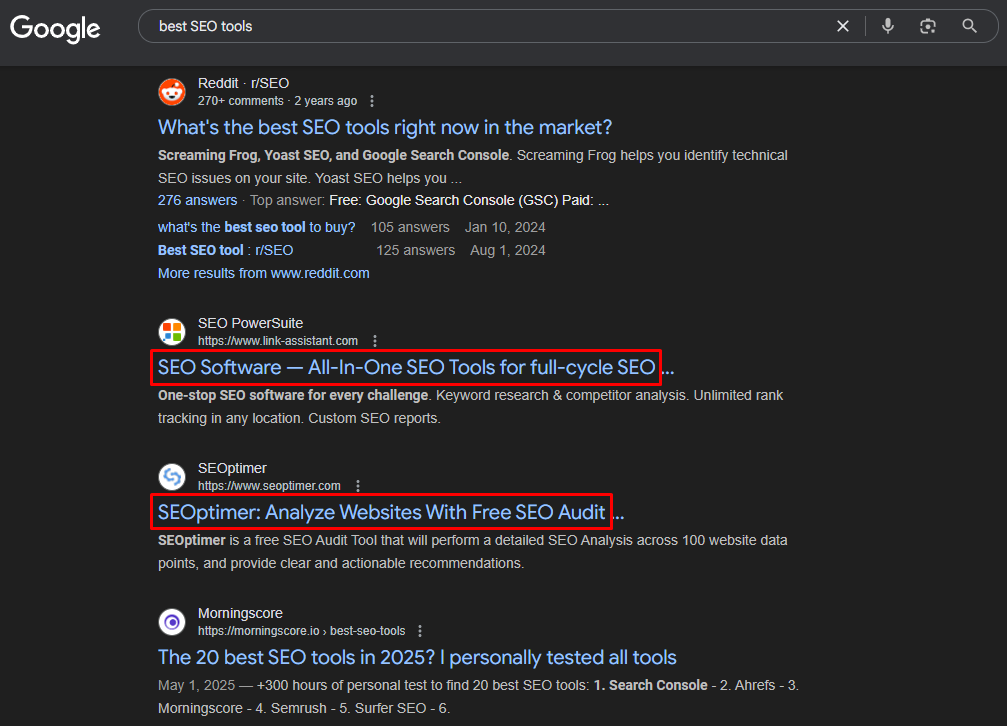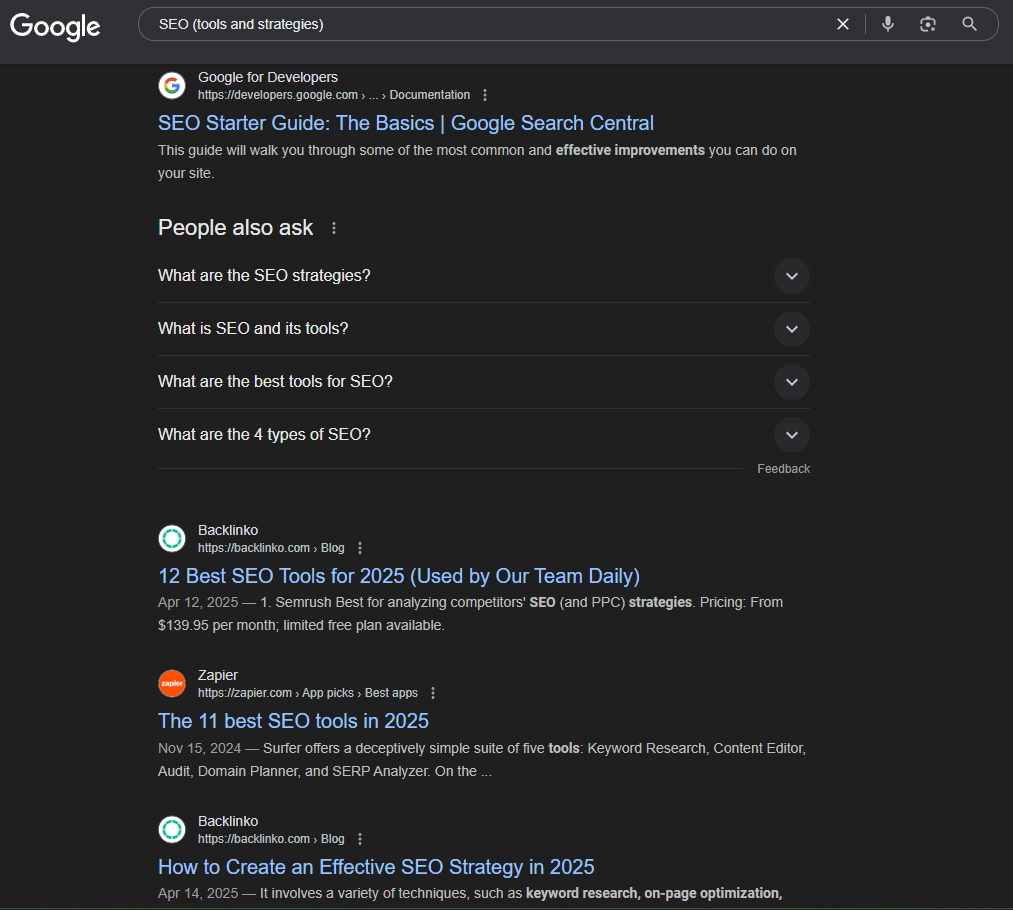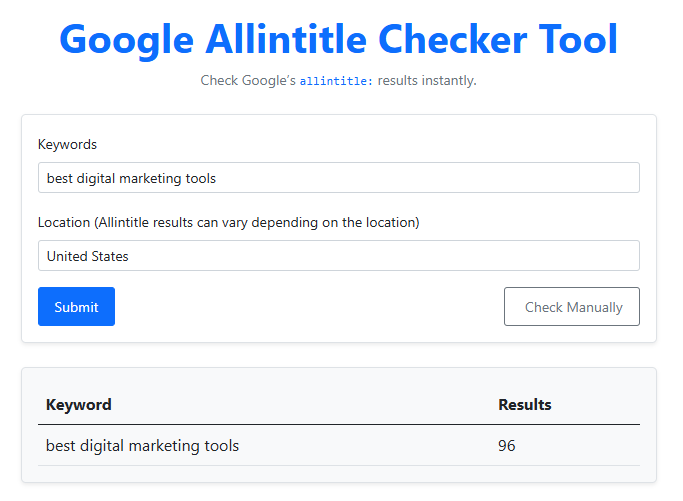Why This Topic Matters for SEO Beginners
If you’re just starting to explore search engine optimization (SEO), you might have come across terms like parentheses in search queries and the allintitle search operator.
While they may seem technical at first, understanding how they work can give you a huge advantage in keyword research and content strategy.
This guide will break down the difference between using parentheses in Google searches versus using the allintitle search operator.
Whether creating content or doing competitive research, mastering these tools can make your efforts more precise and effective.
What Are Parentheses in a Google Search?
Parentheses are often misunderstood in the world of search queries.
Technically, Google does not treat parentheses as special operators the way it treats quotation marks or keywords like “site:” or “intitle:”.
Let’s clear up the confusion:
- If you type something like
(best SEO tools)in Google, the search engine mostly ignores the parentheses. - Google focuses on the words inside the parentheses, not the punctuation marks themselves.
- In contrast to other search engines or coding languages, where parentheses can change the logic or group items, Google Search doesn’t treat them that way.
Example:
Searching for: SEO (tools and strategies) is treated the same as: SEO tools and strategies
In short, parentheses have no direct effect on the search results. They don’t alter how your query is processed.
They’re useful only for organizing your thoughts or making your query easier to read.
What Is Allintitle in a Search Query?
Now, let’s talk about the allintitle search operator, a powerful and underrated SEO tool.
Definition:
The allintitle: operator tells Google to return only those web pages where all the words following it appear in the page title.
Why It Matters:
Page titles are a key SEO ranking factor.
When a keyword appears in the title of a page, it usually means that the content is focused on that topic.
So, using allintitle helps you:
- Filter irrelevant pages from search results.
- See how many competitors have optimized for your exact keyword.
- Evaluate the difficulty of ranking for a particular keyword.
Example:
Searching for: allintitle:best SEO tools will only show pages that have all the words “best”, “SEO”, and “tools” in the title tag.

This vastly differs from a normal search, which returns results that may mention these words anywhere on the page.

Allintitle vs Parentheses: The Core Differences
| Feature | Parentheses | Allintitle |
|---|---|---|
| Purpose | Organizational (for the human reader) | Filtering search results based on page titles |
| Impact on Results | None (Google ignores them) | High (only returns pages with those keywords in the title) |
| Use Case | Clarify complex queries | Keyword research and competition analysis |
| Technical Operator | No | Yes – a true Google search operator |
Use an Allintitle Checker for Keyword Research
If you’re doing SEO, you probably want to know how many pages are using your target keyword in their title.
That’s where an allintitle checker comes in handy.
What Is an Allintitle Checker?
An allintitle checker is a tool (often web-based) that helps you:
- Automatically perform an allintitle search.
- Get the number of results that match your target keyword.
- Quickly compare keyword competition across multiple terms.
Popular Use Cases:
- Finding low-competition long-tail keywords.
- Validating whether a keyword is saturated or underutilized.
- Comparing multiple keywords side-by-side before choosing the best one to target.
Manual Way to Use It:
- Go to Google.
- Type
allintitle:your keyword here. - Look at the results count shown at the top.
The lower the number, the easier it might be to rank for that keyword.
Practical SEO Example: Why This Knowledge Is Useful
Imagine you’re targeting the keyword: “how to speed up WordPress site”
- A normal search will give you millions of results, many of which only mention parts of your keyword.
- But an allintitle search
allintitle:how to speed up WordPress sitemight return a few thousand, giving you a better idea of your true SEO competition.
Knowing this, you can:
- Choose lower-competition alternatives.
- Write more optimized titles.
- Outperform others by targeting neglected long-tail keywords.
Final Thoughts: Which One Should You Use?
If you’re looking to improve your SEO efforts:
- Ignore parentheses in your Google searches—they don’t do much.
- Start using allintitle searches to focus your research on titles that match your target keyword exactly.
- Consider using an allintitle checker tool for faster results and more accurate competitive analysis.
Understanding the difference between parentheses and allintitle is just one step toward becoming a smarter digital marketer.
But it’s a powerful one—especially if you want to rank higher with less competition.
FAQs About Parentheses and Allintitle Search
Do parentheses help narrow down search results on Google?
No, Google typically ignores parentheses in search queries. They don’t change how results are filtered.
What does the allintitle operator actually do?
It returns only those pages that include all the specified keywords in the page’s title, making it useful for SEO research.
Can I use allintitle with multiple keywords?
Yes. Just type allintitle:your keywords here and Google will show pages where all those words are in the title tag.
What’s a good number to see when using an allintitle checker?
There’s no perfect number, but a result count under 100 usually indicates low competition, especially for long-tail keywords.
Is there a difference between allintitle and intitle?
Yes. intitle: only applies to the first word, while allintitle: applies to all the words in the query.

Hamza Sarfraz is an experienced SEO and digital marketing strategist with over six years of expertise in boosting online visibility and growth. Working as a Digital Marketing Manager at MARKETERS.PK focuses on developing data-driven SEO strategies, planning projects effectively, and optimizing performance marketing to help businesses scale.
With a strong interest in technology, SEO, and digital marketing, Hamza shares practical insights to help businesses and professionals keep updated. His hands-on approach to organic search, content marketing, and conversion optimization helps brands strengthen their presence and increase revenue.



